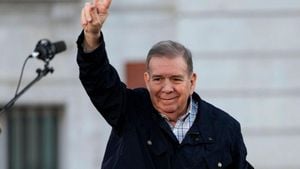The political atmosphere in France is currently charged with tension as President Emmanuel Macron prepares to appoint a new prime minister amid the fallout from Michel Barnier’s recent ousting. This political upheaval, taking place less than one week after Barnier was toppled via a no-confidence vote, has left Macron under immense pressure to quickly establish leadership capable of managing mounting social and economic issues.
According to sources within the government, Macron is expected to announce the new prime minister after returning from his trip to Poland. Many are keeping their eyes peered on the events as the decision is likely to shape the future of the government and influence France’s political dynamics significantly.
Macron had assured party chiefs during conversations held earlier this week at the presidential Elysee Palace, promising to appoint a new government chief within 48 hours. This statement indicates his urgency to stabilize his administration and forge new alliances amid the fragmented political scenario.
The French legislative body is divided more or less evenly among varying political factions, from the far-right National Rally (RN) to the left-wing faction led by La France Insoumise (LFI). Macron's goal is to create a broad coalition capable of withstanding potential no-confidence motions and allowing his government to execute the necessary budget proposals for the upcoming year to mitigate economic uncertainties.
The political tension escalated recently when Barnier, during his final cabinet meeting, underscored challenges such as public debt and the pervasive feelings of disenfranchisement experienced by constituents grappling with various injustices, including education, health, and economic inequality. He invoked concerns surrounding rural and territorial divides, accentuating the pressing need for effective governance and outreach.
Several candidates are reportedly being considered for the role of prime minister, including Macron’s centrist ally François Bayrou, who, at 73, has garnered mixed reactions from left-leaning factions. Olivier Faure, the leader of the Socialist Party, has expressed discontent with Bayrou's potential selection, asserting it might represent unwanted continuity.
Additional rumors have surfaced around former foreign minister Jean-Yves Le Drian and current Defense Minister Sébastien Lecornu as other possible candidates. Meanwhile, the interim government’s spokesperson, Maud Brégeon, referred to discussions around forming a non-aggression agreement involving various parties pledging not to de-stabilize the government.
The challenges intensify as recent polls indicate considerable public support for collaborative governance, with around two-thirds of those surveyed by Elabe supporting the notion of a “no-censure” deal among rival parties. This sentiment reflects the populace's desire for stability during these uncertain times.
The politics following the governmental collapse have witnessed parties previously vying for control pivoting to discussions on potential collaborative approaches, which many view as notable progress. This includes the left faction signaling their willingness to hold off on deploying Article 49.3 of the constitution, which enables the government to push through certain legislation without parliamentary votes—an action typically viewed with skepticism.
Le Pen, the leader of the National Rally, stated her contentment with not being invited to the coalition talks, indicating the complicated relationship between Macron’s bloc and far-right factions. Meanwhile, the specter of the next presidential elections looms, with many questioning how recent political shifts will affect campaigning and voter sentiments.
Following the recent defeat, Macron's presidency is experiencing unprecedented turbulence as the French parliament contends with dissatisfaction across party lines. Both conservatives and progressives must navigate their grudges and work through existing divides if they hope to establish coherent governance.
The financial umbrella hanging over the new prospective government is also glaringly real, as Barnier highlighted the dire need to confront national debt head-on. Macron has previously signaled intent toward forging partnerships across party lines to construct what he deems is necessary for national interest, including facing economic challenges transparently and collaboratively.
Despite concerns hovering over possible conflict of interests amid Bayrou's candidacy, determination persists among different political contingents to stabilize the country. The dual strategy of broadening the current coalition or negotiating terms of cooperation with leftist factions will be key as Macron studies the ever-evolving political chessboard before finalizing his cabinet.
While timelines can be slippery, the French public and its members of government are anticipating swift developments. Macron’s forthcoming choices are sure to redefine the governmental structure and approach to governance, including decisions poised to influence legislative matters as France steps forward amid renegotiated partnerships.



